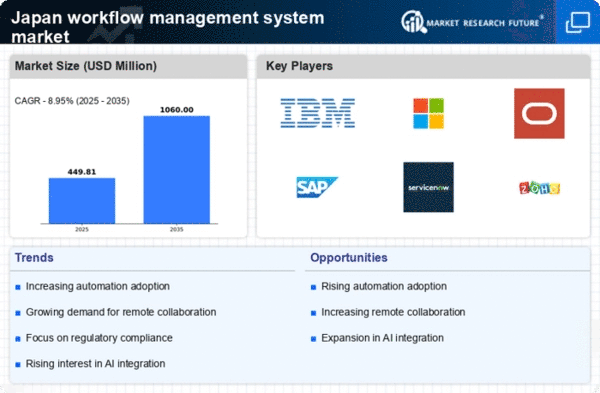Rising Demand for Efficiency
The workflow management system market in Japan experiences a notable surge in demand for efficiency across various sectors. Organizations are increasingly recognizing the need to streamline operations and reduce redundancies. This trend is particularly evident in industries such as manufacturing and services, where operational efficiency can lead to significant cost savings. According to recent data, companies that implement effective workflow management systems can achieve up to 30% improvement in productivity. This drive towards efficiency is compelling businesses to invest in advanced workflow solutions that facilitate better task management and resource allocation, thereby enhancing overall performance in the workflow management-system market.
Regulatory Compliance Requirements
Regulatory compliance is becoming increasingly critical for businesses operating in Japan, thereby impacting the workflow management system market. Organizations are required to adhere to various local and international regulations, which necessitates the implementation of robust workflow systems that ensure compliance. This demand is particularly pronounced in sectors such as finance and healthcare, where regulatory scrutiny is stringent. As of November 2025, it is estimated that compliance-related investments in workflow management systems have increased by 25% among Japanese companies. This trend underscores the importance of integrating compliance features into workflow solutions, as businesses strive to mitigate risks and enhance their operational integrity in the workflow management-system market.
Technological Advancements in Software
Technological advancements play a crucial role in shaping the workflow management system market in Japan. The introduction of artificial intelligence (AI) and machine learning (ML) capabilities into workflow solutions is transforming how organizations manage their processes. These technologies enable predictive analytics, which can optimize workflows and enhance decision-making. As of November 2025, it is estimated that approximately 40% of Japanese companies are adopting AI-driven workflow management systems, reflecting a growing trend towards automation and intelligent process management. This shift not only improves operational efficiency but also positions businesses to respond more effectively to market changes, thereby driving growth in the workflow management-system market.
Increased Focus on Remote Work Solutions
The shift towards remote work has significantly influenced the workflow management system market in Japan. As organizations adapt to flexible work arrangements, there is a heightened need for systems that support collaboration and communication among distributed teams. This trend is prompting companies to invest in cloud-based workflow management solutions that facilitate seamless interaction and project tracking. Recent statistics indicate that around 60% of Japanese firms are prioritizing remote work capabilities in their workflow systems. This focus on remote work solutions is likely to continue, as businesses recognize the importance of maintaining productivity and engagement in a hybrid work environment, thus propelling growth in the workflow management-system market.
Growing Emphasis on Data-Driven Decision Making
The emphasis on data-driven decision making is reshaping the workflow management system market in Japan. Organizations are increasingly leveraging data analytics to inform their operational strategies and improve efficiency. This trend is evident as companies seek to harness insights from workflow data to optimize processes and enhance performance. As of November 2025, approximately 50% of Japanese enterprises are utilizing data analytics within their workflow management systems, indicating a shift towards more informed decision-making practices. This growing reliance on data not only enhances operational effectiveness but also positions businesses to adapt to changing market dynamics, thereby fostering growth in the workflow management-system market.
















